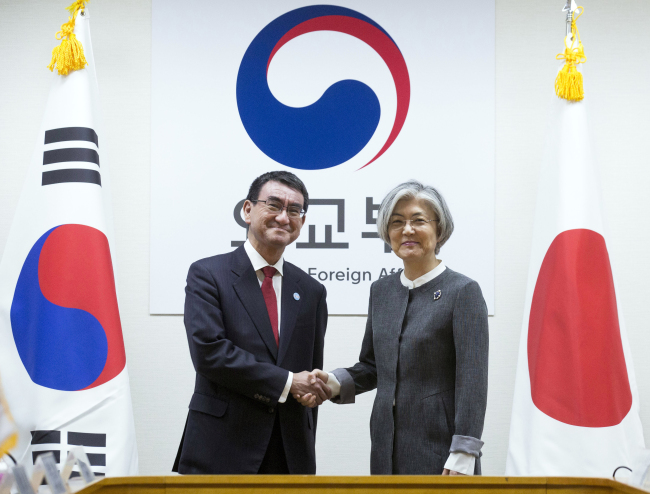S. Korean, Japanese FMs vow cooperation on N. Korea
By Ock Hyun-juPublished : April 11, 2018 - 16:52
Japanese Foreign Minister Taro Kono met South Korean President Moon Jae-in and Foreign Minister Kang Kyung-wha on Wednesday to discuss North Korea’s nuclear issue and bilateral relations, as Japan struggles to remain relevant to the upcoming inter-Korean summit.
During an hourlong meeting, Kang and Kono reaffirmed their pledge for close coordination and communication to achieve North Korea’s denuclearization in the lead-up to the April 27 inter-Korean summit and the US-North Korea summit expected to happen by early June.
“With preparations underway for South Korea and the United States’ summits with North Korea, which could serve as a major turning point in attaining denuclearization, (we) hope for cooperation to achieve the two countries’ shared goal of peacefully resolving the North’s nuclear issue and establishing peace,” Kang said in opening remarks ahead of the meeting with Kono.
“I want Japan and South Korea to closely coordinate to realize the denuclearization of North Korea and bring about peace, stability and prosperity in Northeast Asia,” Kono said, hailing the Korean government’s diplomatic efforts in bringing North Korea to dialogue.
During an hourlong meeting, Kang and Kono reaffirmed their pledge for close coordination and communication to achieve North Korea’s denuclearization in the lead-up to the April 27 inter-Korean summit and the US-North Korea summit expected to happen by early June.
“With preparations underway for South Korea and the United States’ summits with North Korea, which could serve as a major turning point in attaining denuclearization, (we) hope for cooperation to achieve the two countries’ shared goal of peacefully resolving the North’s nuclear issue and establishing peace,” Kang said in opening remarks ahead of the meeting with Kono.
“I want Japan and South Korea to closely coordinate to realize the denuclearization of North Korea and bring about peace, stability and prosperity in Northeast Asia,” Kono said, hailing the Korean government’s diplomatic efforts in bringing North Korea to dialogue.

Kono’s visit comes amid concerns in Japan that the diplomatic drive led by South Korea, North Korea and the US could fail to meet its security concerns and interests as it is sidelined in the denuclearization talks.
The top diplomats shared the perception that the countries are facing a historic period in denuclearizing the North and bringing about peace to the Korean Peninsula, an official from Seoul’s Foreign Ministry told reporters on the condition of anonymity.
Kono said that the pressure campaign and sanctions against North Korea should be maintained until the North takes concrete actions for its denuclearization. Kang agreed that the pressure campaign should continue but she also underscored the importance of maintaining the momentum of “dialogue” with North Korea, the official said.
Kono also asked Kang to bring up the issue of North Korea’s abduction of Japanese nationals in the 1970s and 1980s during the inter-Korean talks, according to the official. The top diplomat reiterated Japan’s position that the abduction issue should be dealt with “comprehensively,” along with the North’s nuclear and missile ambitions in the upcoming summits.
The issue of Japanese nationals abducted by North Korea remains highly critical for Japan. Japan has said North Korea abducted at least 17 Japanese citizens to train agents to spy on South Korea. North Korea acknowledged in 2002 that it had abducted 13 Japanese. It has released only five of them, saying the other eight had died.
Kang said that South Korea will continue to strive to tackle humanitarian issues, though she did not give him an assurance about his request. She said she cannot be sure about what specific agenda items will be discussed during the inter-Korean meeting, according to the official.
Kono arrived in South Korea late on Tuesday, on his first visit to the country since taking the post in August last year. It was the first visit by Japan’s top diplomat since December 2015.
Kono paid a courtesy call later in the day to President Moon Jae-in.
Moon said ahead of their meeting that it is a period when close communication and cooperation between South Korea and Japan is particularly important. Kono also expressed hope for enhanced coordination among South Korea, the US and Japan, and said he looks forward to having Moon in Japan for a planned trilateral summit among South Korea, China and Japan.
Kono also visited the Seoul National Cemetery to pay tribute to Korean War veterans, which some pundits interpret as a sign of Japan‘s willingness to improve bilateral relations. He had dinner with Kang and returned to Japan in the evening.
Although Seoul and Tokyo present a united front in tackling North Korea’s nuclear issue, bilateral relations have been strained over historical matters, including Japan’s wartime sexual slavery of Korean women and Japan’s claims to South Korea’s eastern islets of Dokdo.
Kang acknowledged that the two neighbors face challenges. But she expressed hope that the two countries could build “forward-looking” relations and focus on boosting cooperation in such sectors as economy, culture and personnel exchanges, which could be mutually beneficial.
On bilateral relations, the two countries agreed to launch working-level talks to draw up a “blueprint” to deepen their ties, marking the 20th anniversary of the joint declaration for a “new partnership” by the late former South Korean President Kim Dae-jung and Japan‘s then-Prime Minister Keizo Obuchi in 1998.
By Ock Hyun-ju (laeticia.ock@heraldcorp.com)
-
Articles by Ock Hyun-ju



![[AtoZ into Korean mind] Humor in Korea: Navigating the line between what's funny and not](http://res.heraldm.com/phpwas/restmb_idxmake.php?idx=644&simg=/content/image/2024/04/22/20240422050642_0.jpg&u=)
![[Exclusive] Korean military set to ban iPhones over 'security' concerns](http://res.heraldm.com/phpwas/restmb_idxmake.php?idx=644&simg=/content/image/2024/04/23/20240423050599_0.jpg&u=20240423183955)



![[Graphic News] 77% of young Koreans still financially dependent](http://res.heraldm.com/phpwas/restmb_idxmake.php?idx=644&simg=/content/image/2024/04/22/20240422050762_0.gif&u=)
![[Herald Interview] Why Toss invited hackers to penetrate its system](http://res.heraldm.com/phpwas/restmb_idxmake.php?idx=644&simg=/content/image/2024/04/22/20240422050569_0.jpg&u=20240422150649)






![[Exclusive] Korean military to ban iPhones over security issues](http://res.heraldm.com/phpwas/restmb_idxmake.php?idx=652&simg=/content/image/2024/04/23/20240423050599_0.jpg&u=20240423183955)



![[Today’s K-pop] Ateez confirms US tour details](http://res.heraldm.com/phpwas/restmb_idxmake.php?idx=642&simg=/content/image/2024/04/23/20240423050700_0.jpg&u=)